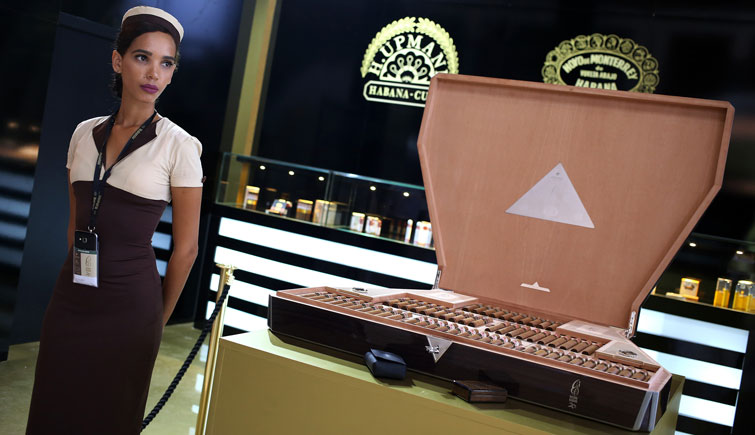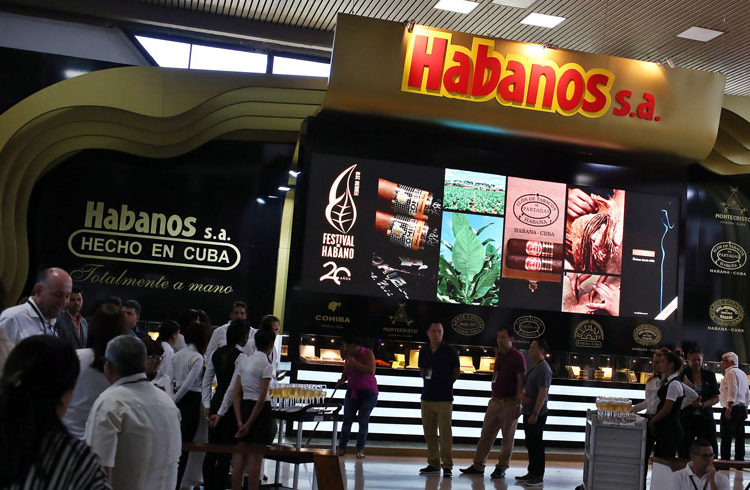The Habanos Festival is paradise for lovers of the best tobacco. The aroma of the world’s most famous Premium cigar surrounds the days of an event in which manufacturers, distributors and smokers come together to pay tribute to one of Cuba’s iconic products.
The festival is celebrating its 20th edition with eloquent numbers. More than 2,000 participants from some 70 countries are meeting in the Havana Convention Center, while 184 exhibitors from 14 countries are livening up the Commercial Fair with the greatest foreign participation of recent years.
Two of the paradigmatic brands of Habanos: Cohiba and Partagás, were the protagonists in the festival’s most awaited launchings: the 2014 Reserva Cosecha of the Cohiba Robustos vitola, with a unique and exclusive production of 5,000 numbered boxes, and two new vitolas – the numbers 2 and 3 – of the Partagás Maduro Line.
In addition, new vitolas of the Hoyo de Monterrey and Vegueros brands will also be presented, as well as limited editions of Bolívar, H.Upmann and Romeo y Julieta, of which the Humidor Grand Churchills will also be launched, a veritable jewel created by craftsman Jean-Philippe Martin in Elie Bleu workshop in Paris.
During the event’s days there will be visits to tobacco plantations in the famous zone of Vuelta Abajo, in Pinar del Río, and to Habanos factories in the Cuban capital; tasting and combinations with spirits like the toasts of the Spanish Torres Company and the Havana Club Tributo 2018 rum; theoretical sessions about the history and cultural value of tobacco; and artistic galas with relevant figures of Cuban music and dance like Los Van Van, Alain Pérez, Lizt Alfonso, Carlos Varela and the Orishas group.
The traditional Habanosommelier International Contest has been holding since this Monday its 17th edition, while the Habanos World Challenge is taking place for the first time, featuring aficionado teams from different countries putting to the test their knowledge about Cuba’s Premium cigars.
The winners of both competitions will be announced this March 2 during the closing day of the event, in which the Habanos Prizes will also be awarded – in the Production, Communication and Business categories -, and the traditional auction of Humidors will be held, whose profits will be integrally devoted to the Cuban Public Health system.
At the height of growth
The 20th edition of the Habanos Festival is backed by the growth experienced by the Habanos Company in 2017. Last year the Cuban-Spanish joint venture reported for the first time 500 million dollars’ worth of incomes, a 12 percent increase in relation to 2016, according to what the corporation’s development vice president, José María López, said at the event’s opening.
“If we compare ourselves to the luxury sector, of which we form part with our Premium products, and that last year we grew 5 percent, we can confirm that we are surpassing this sector’s commitment on a world level, and that makes us feel very proud of the results of 2017,” López commented.
Europe continues being the principal market for Cuba’s cigars, with 54 percent of the sales, while the rest is distributed among the Americas (17 percent), Asia Pacific (15 percent) and Africa and the Middle East (14 percent).
By countries, Spain and France head the sales, while China went up to third place, before Germany and Cuba, thanks to a 33 percent growth in 2017.
In terms of brands, Cohiba predominates with 23 percent of the sales in value, while Romeo y Julieta and Montecristo take up 17 percent.
Even without the U.S.
In 2017 a total of 450 million cigars were sold, which for the Cuban-Spanish company represented a 70 percent quota in units and 80 percent in value of the markets where they are marketed. These numbers were produced despite the fact that the company cannot sell its product in the United States – the first world market for Premium cigars – as a consequence of the embargo.
“If we could sell there, it is to be assumed that the results would be important, but since it is a banned market for us it doesn’t enter in our sales strategies,” José María López affirmed to EFE.
However, this prohibition does not prevent Americans visiting the island from buying Cuban cigars and even taking back to their country a certain amount for their personal use, according to the regulations approved during the Obama administration.
And although Donald Trump imposed restrictions on Americans’ doing business with and traveling to Cuba, the Habanos executives do not consider that their sales have been affected by these measures.
“We sincerely cannot distinguish how the sales have been affected in the domestic market,” said Leopoldo Cintra González, the company’s marketing vice president. “We haven’t seen a decrease because of this reason, although we of course would like it if these measures were to change.”

According to Cintra, in 2017 the Cuban domestic market – which includes the purchases made by tourists on the island – registered a 15 percent growth, three points more than the company’s average sales on a global scale.
“We really feel very hopeful with this development,” commented the marketing vice president, who affirmed that for this year his company expects a “very good harvest,” with no climate phenomena damages as those of Hurricane Irma.
In the 2017-2018 harvest, Cuba plans to collect some 32,000 tons of tobacco, one of the island’s principal export products. In the previous harvest 30,755 tons were collected.










